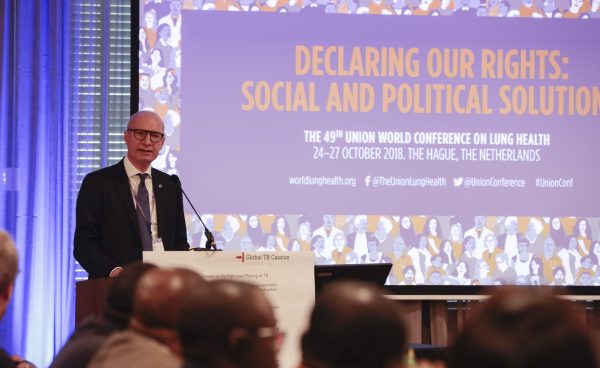
It’s always inspiring to speak with the Global TB Caucus. The decisions you make impact millions of people, so as I look around the room, and I see the global scale of the progress we can make by working together.
It’s been four years since the Global TB Caucus was launched. It was 2014 at The Union World Conference in Barcelona, and since then the Caucus has become one of The Union’s most important partners.
How many of you here were in Barcelona?
For how many of you is this the first time coming to the Union World Conference?
Welcome – it’s terrific. I’m very happy you’re here.
I was asked to speak a bit about the political progress we’ve made recently, and about the work we need to do as we move forward.
Speaking as the Executive Director of The Union, I feel very positive about the position we’re in right now when it comes to the political context. We have a far way to go, but right now, we have the greatest political opportunity to make progress on TB as far as I can remember.
The political declaration coming out of the High Level Meeting last month is strong. And I want to say, we would never have gotten the commitments we got in that declaration if not for work you did for many months leading up to the General Assembly. It was very impressive, and it was so well coordinated with what other areas of civil society were doing at the same time.
The question we’re all facing now is, How do we capture this global political support and use it to drive progress within countries? Because if we don’t use the momentum we have now, we’ll lose it.
With the political declaration, with the G20 and G7 platforms, TB is on the agendas of heads of state and government—I don’t think we need to communicate that TB should be on their agenda.
It’s already there—the priority now is keeping TB on the agendas of national leaders, and making sure the implementation happens that is needed to fulfill those commitments.
Looking at the political commitments national leaders have made related to TB—through the HLM, through the G20 and even the specific G7 commitment to accelerate efforts against TB— as a partner that works closely with governments, it’s useful for us to understand how those TB commitments align with the platforms of your national leaders.
Look at Kenya, for example: President Kenyatta’s platform, the “Big Four.” He’s focused on universal health coverage, food security, quality and affordable housing, and improved manufacturing. TB ties in with all four pieces of his national platform.
As MPs, you have the best knowledge of the platforms of your heads of state and government. You are in the best position to speak the language of the presidential platform and communicate how TB fits into it. And the more you can help us understand how TB political commitments fit in with the platforms of your heads of state and government, then the more The Union and our other advocacy partners can help keep TB relevant for national leaders.
Another way to help drive national implementation is to help create regional accountability for implementing TB commitments. TB is airborne and crosses borders as people cross borders. This is where having regional TB platforms for heads of state and government can be useful.
If we can do those things to keep TB high on political agenda, the next challenge is turning that political will into the most high-impact activities on the ground. Because to end TB, we need the epidemic to be falling at much higher rates than it’s falling now.
Presidents and prime ministers often create national task forces to drive progress on important pieces of their platforms. If we had national TB task forces appointed by, and working on behalf of heads of state and government, with the authority to mobilize responses to fulfill TB commitments involving actors from across different sectors, I think it could help change the speed at which we’re making progress.
The key thing would be to ensure those task forces have the mandate to develop creative solutions that are going to get us from 2% declines in TB each year, to the 4, 5, and 10 percent declines we need. They need to be empowered to drive big ideas.
This is where The Union can be a strong resource. We have about a thousand staff and consultants around the world, and we have several thousand members. These are experts, university faculty, researchers, etc. Many of them are naturally the type of people who would be fit to serve on national or even regional task forces on TB.
The last thing I’ll say is that last August, The Union and the Caucus worked together and led a delegation of MPs to Uganda. We had nine MPs from five African countries. And they learned about DETECT Child TB, a model we have developed for addressing TB in children at the community level. This was a very successful collaboration. As you’re look for solutions or models that your countries could implement to fulfill these political commitments for TB, please look to us as a resource.
Thank you again for your leadership, and for your partnership.